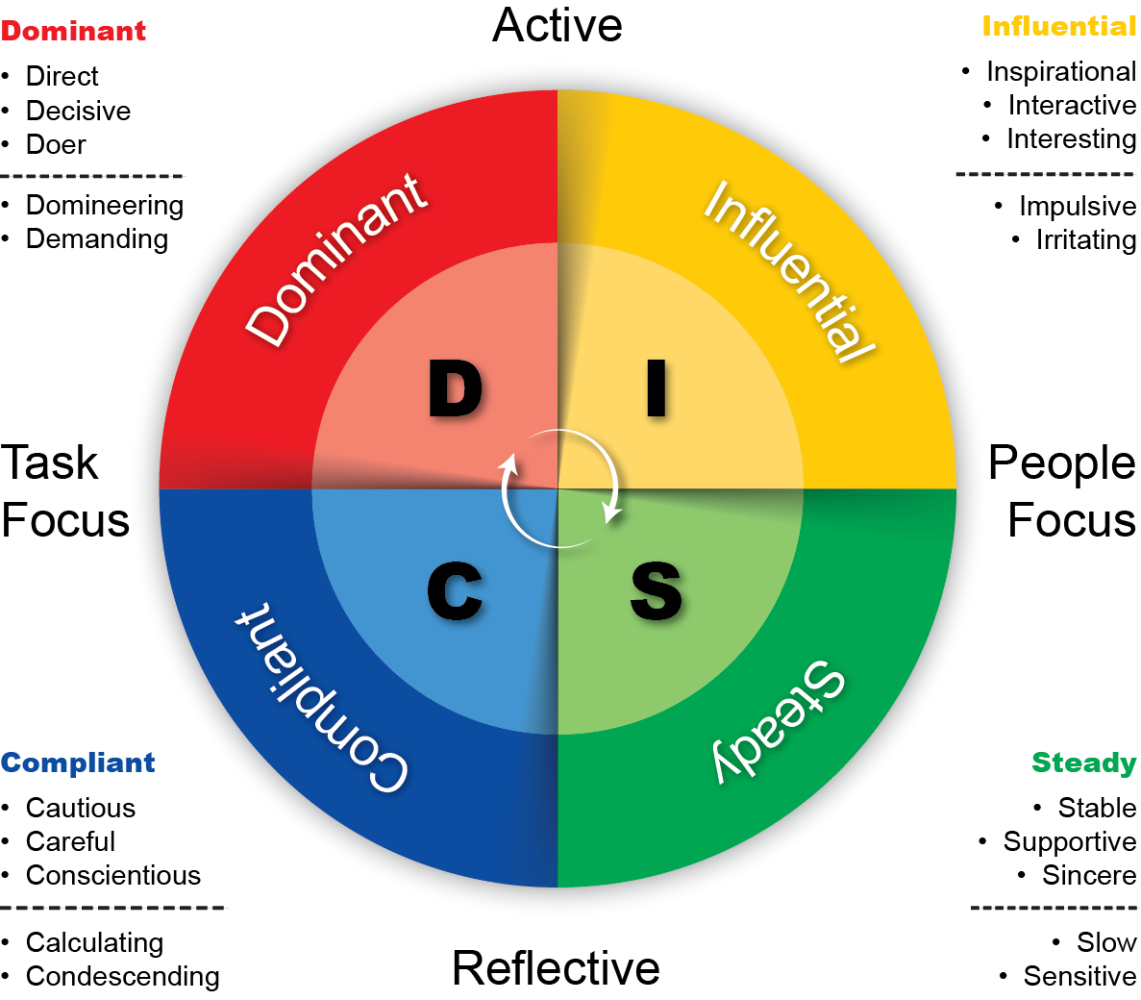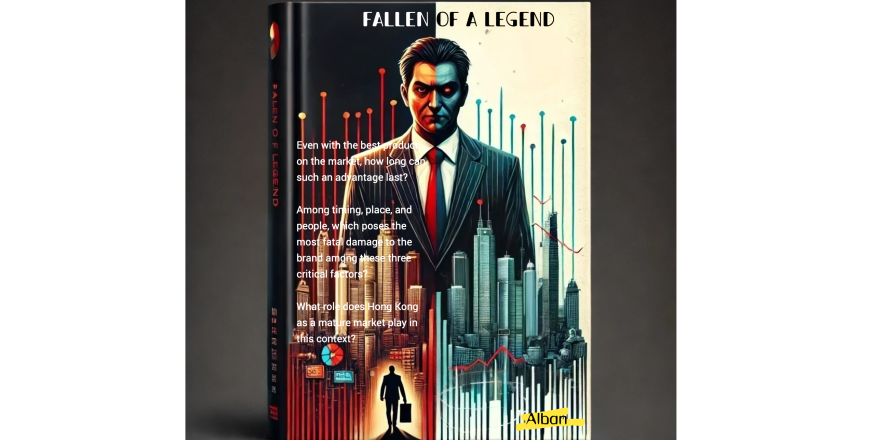 x
x
In Aesop's fable, a scorpion wanted to cross a river but couldn’t swim, so it asked a frog for help. The frog refused, fearing that the scorpion might sting it. The scorpion reassured the frog, saying, "If I sting you, we’ll both drown since I can’t swim." The frog believed and agreed to carry the scorpion across. But halfway across the river, the scorpion stung the frog. As the paralyzed frog began to sink, it cried, "Why did you sting me? Now we’ll both drown!" The scorpion replied, "I couldn’t help it. It’s in my nature."
Perhaps some people, like the scorpion, cause harm by nature, even knowing they’ll harm themselves. Whether the scorpion shed tears or felt regret in its final moments before sinking is something only the heavens know.
If we try to understand An Zhiren’s personality through DISC behavioral analysis, he would likely fall under the extreme "Dominant" personality type. The DISC personality test, created by American psychologist William Moulton Marston, is a tool that measures emotions and behavior patterns. It analyzes personality across two dimensions: (1) the horizontal dimension of being people-oriented versus task-oriented, and (2) the vertical dimension of being outgoing versus reserved. Based on the balance of these four factors, DISC represents four personality types: Dominant, Influence, Steady, and Compliance. These traits shape an individual’s thoughts, preferences, and behaviors.

People with a dominant personality type enjoy taking risks and typically make decisions based on intuition. When faced with explanations or clarifications from others, they prefer concise, quick interactions. They may have perfectionist tendencies, making it difficult for them to empathize with others. If unchecked, this can manifest as arrogance and a desire for control, making them appear aggressive, overly ambitious, or emotionally detached. However, those with this personality type often don’t view these traits as flaws; instead, they take pride in them, believing these qualities are what make them successful.
As the Hong Kong management team interacted more with An Zhiren, they realized that his methods and values clashed significantly with those of the Hong Kong team. Initially, they thought it was merely an issue of adaptation and patiently offered explanations and guidance. But over time, his true nature became more apparent, leading to confusion and frustration within the team.
The Hong Kong team had always been passionate, a key element behind the branch’s success. During An Zhiren’s stay in Hong Kong, the sales team would take him to meet key clients. While the sales representatives enthusiastically analyzed customer success stories and business plans, An Zhiren seemed disinterested, showing no engagement. When sales representatives expressed pride in the growth of their major clients, he would dampen their enthusiasm, warning them not to rely too heavily on these big accounts and questioning whether their growth was sustainable. When he met with prestigious specialists, he complained that their patient fees were too high and volume was too low. And when doctors complained, he completely dismissed them, giving self-serving speeches about Allie investing billions annually in product development, insisting that no competitors could match them.
The sales team became reluctant to bring An Zhiren for customer visits. For his part, An Zhiren also saw no need to meet clients, telling the sales team, "As long as they're making money, they’ll stick with us. I don’t want to waste my time entertaining them!" This left the sales team feeling deeply discouraged. His arrogance did not go unnoticed by the clients either, and without a foundation of trust, many expressed that they no longer wished to meet with him.

An Zhiren was highly opinionated and often came up with unconventional promotional ideas. His first move was to gamble on pricing, prominently advertising steep discounts and then using market demand to pressure doctors into lowering their prices to align with these promotional efforts. In theory, cutting prices to generate market demand is a valid marketing strategy, but whether this approach could achieve the same results for a high-end medical brand remained uncertain.
Over the next three years, the Hong Kong team was under pressure to slash prices, positioning themselves directly against second and third-tier brands in an aggressive price war. They aimed to secure overwhelming victories, but this strategy was like wielding a double-edged sword, harming not only competitors but also Allie themselves. The first to suffer were the doctors who had long supported Allie. These doctors had partnered with Allie for years, using the best products in the market to build a high-end service culture and values in their clinics. Yet, to An Zhiren, this meant nothing.
For years, these doctors worked alongside the Hong Kong team, educating the public and gradually raising awareness of Allie's new technology and service quality. An Zhiren, however, could not comprehend the sacrifices behind their efforts—the blood, sweat, and tears. To him, a short-term price cut was a more direct way to boost sales than building long-term brand value. He bluntly stated, "It doesn’t matter to me which doctor uses our products. If a doctor isn’t willing to lower prices, then it’s only natural that other doctors willing to do so will take their place."

An Zhiren’s second strategy was equally unconventional, almost breaking conventional wisdom. As a business-to-business (B2B) professional medical brand, he insisted on placing most of Allie’s resources into targeting consumers—a wildly impractical "red ocean" approach. Ignoring the Asia-Pacific headquarters' directive to focus on building brand value, he relentlessly pressured the Hong Kong marketing team to pursue potential patients directly, even though the returns were illogical. This strategy resembled searching for a needle in a haystack, with limited resources yielding minimal results. Despite knowing that these misallocated resources couldn’t open new opportunities, An Zhiren disregarded the negative consequences, blaming the marketing team for failing to execute his strategy effectively. Professional market analysis and the experience of the marketing managers were meaningless to him.
One external promotional effort trying to collaborate with other high-end brands in Hong Kong. An Zhiren believed that promoting these luxury brands for free in exchange for them distributing Allie cash coupons to their clients would create a win-win situation. Without conducting any market research, he reassigned Miriam, the most senior business development manager focused on building relationships with doctors in the B2B sector, to pursue partnerships with high-end brands instead. He suggested that Miriam join business associations, visit luxury stores, and use her network to approach major companies in Hong Kong—essentially gambling on a long shot.
Anyone with basic marketing knowledge would know that such a method requires heavy time investment but returns are low for the brand and products. It’s a last-resort strategy, only used when all other resources are exhausted. Luxury and medical brands have little in common, so why would these companies have no interest in promoting Allie’s new technology to their customers or staff? Predictably, the initiative failed, and poor Miriam’s efforts went unrewarded, leaving her with a tarnished reputation for "underperformance." Whether this was due to An Zhiren’s ignorance of the market and marketing principles or simply an attempt to use company resources to establish personal connections with luxury brand executives remains unknown.

History always proves that while short-term promotions may yield immediate results, a high-end medical brand cannot rely on pricing alone to compete with second and third-tier brands. Pouring limited resources into aggressive "red ocean" promotions and gambling on short-term demand, rather than building a strong brand with quality and long-term partnerships with doctors, creates a deep conflict and fragmentation within the brand.
As the saying goes, one wrong move can ruin the entire game. Over three years, loyal customers began to lose faith in Allie as the company focused on attracting new customers with low-price strategies, neglecting the feedback and needs of its loyal base. An Zhiren, in his arrogance, disregarded the sentiments of these long-term clients, assuming they had no choice but to stay with the brand they had worked so hard to establish. He preferred to elevate low-usage doctors by a discount strategy. Unfortunately, the new customer base was weak, and without the support of loyal clients, Allie was no longer able to lead the market. Competitors quickly gained ground, and the brand’s positioning became increasingly blurred among doctors and consumers, further damaging the company’s high-end image.
The once united and passionate Hong Kong team could only watch in frustration as the high-end brand they had painstakingly built over the past decade became "cheapened." They knew the drastic 180-degree shift would lead to Allie’s downfall, leaving the company in ruins. They understood the importance of gratitude and reciprocity, especially to those who had supported them through difficult times. Inspired by the Queen and Kenji, the Hong Kong team constantly reminded themselves to offer the best service and pricing to the loyal users who had believed in Allie from the start, and to reward the employees who had worked alongside them in the trenches.
Despite their loyalty and dedication to the company, the team’s efforts to convince An Zhiren, even appealing to his superiors, were in vain. With his dominant personality, An Zhiren refused to heed any advice, and this "disobedience" planted the seeds for a future restructuring in Hong Kong.
Deborah, the marketing manager, was a seasoned expert whom Kenji had recruited after presenting her with the company’s ambitious vision. She had extensive experience on both professional and consumer marketing, making her a rare talent in the market. Deborah recognized that such a drastic change in strategy would leave customers confused and Allie in ruins. Despite her efforts to persuade An Zhiren, he refused to listen. This defiance set the stage for future turmoil, and Deborah's future is put in danger, as detailed in later chapters.

There are only two ways to influence people: manipulation or inspiration. From business to politics, manipulation is everywhere, taking on the form of various marketing tactics. Common manipulative strategies include price wars, promotions, and leveraging fear, peer pressure, or desire. When an organization doesn't understand why customers choose its products, it often uses those manipulative techniques to achieve its goals. The reason is simple—manipulation works because it's easy. Price is one of the most effective manipulative tools. Lower prices will drive consumers to buy, which is why end-of-season discounts are so common. However, price wars can have staggering consequences and may even trap companies in a dilemma. For sellers, price wars are like heroin; the short-term profits are exhilarating, but over time, they can have damaging effects. Once buyers become accustomed to low prices, it is difficult to get them to pay more. Facing increasing pressure from price competition, sellers are forced to sacrifice profits, relying on high-volume, low-margin strategies to close the profit gap. The simplest method is still lowering prices to increase volume, so the vicious cycle of price competition becomes inescapable.
Savvy marketers, on the other hand, focus on building the brand, enhancing the user experience, and increasing customer loyalty, all to add value to their products. This encourages customers to pay higher prices, aligning with the company's long-term interests. The danger of relying on manipulation is that it works. And because it works, most organizations employ these techniques, creating systemic peer pressure. Ironically, the manipulators themselves fail due to being controlled by the very system they created. Each discount promotion weakens the organization bit by bit.

Whether internally or externally, An Zhiren always preferred using a "carrot and stick" approach, relying on manipulation to exploit human vulnerabilities. He believed that lowering prices would inevitably increase sales, bonuses would boost morale, and punishment would instill fear and obedience. While manipulation works, it comes at a high cost, and its effectiveness diminishes over time. When the money for such tactics runs out, the lack of loyal customers leaves the business more vulnerable. Having a loyal base of customers and employees not only helps reduce operational costs but also ensures the company’s steady growth. Like a loyal friend, you know that your customers and employees will stand by you when you need them, giving you great confidence. The capability to create this sense of shared commitment and deep connection between customers and businesses, and between bosses and employees, is the basic requirement of great leadership.
Some people are born with the ability to inspire others, helping them unlock potential and realize their vision. Leaders who are naturally adept at inspiring are rare, in all circumstances, they hold extraordinary influence. They have the most loyal customers and employees, with a capacity for profit and innovation that often surpasses competitors. More importantly, they can maintain these advantages over the long term. Those leaders have transformed entire industries, and some have even changed the world. Leaders who can communicate a shared vision have a magnetic pull, creating a sense of belonging and making people feel special and secure. Those who are inspired share a strong sense of identity and connection.
An Zhiren, however, is incapable of inspiring others. He cannot rally employees or customers around a common vision, and his cold, manipulative tactics are the only tools at his disposal. He struggles to understand others’ feelings and cannot identify or describe emotions in himself or others—possibly a result of alexithymia, a condition associated with an inability to empathize.

As the Chinese proverb goes: "In war, a general’s success is built on the bones of countless soldiers." An Zhiren’s aggressive methods have left the sales and marketing departments in disarray, with employees constantly complaining. Dr. Fang, a respected and beloved figure among colleagues and clients, is beginning to feel unappreciated and is considering leaving the company.
ns 15.158.61.45da2






















